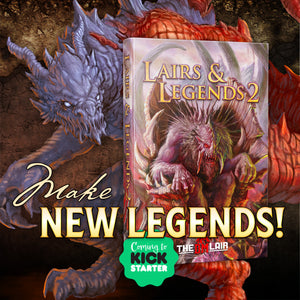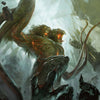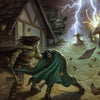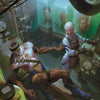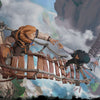The Magic of Godstein Games

By Luke Hart
What if the gods behind your world weren’t ancient deities or dusty pantheon charts—but your players?
No maps. No lore. No prepared setting. Just a table full of players, wild ideas, and the freedom to build a mythos from scratch. One moment you’re deciding whether fish can dream; the next, you’re navigating a political crisis caused by the god of fungus and the god of secrets wiping out half a continent. Welcome to the chaos—and brilliance—of a Godstein campaign.
In this style of game, players don’t just explore the world—they create it. From the shape of the land to the laws of magic to the rise and fall of civilizations, everything begins with the gods sitting around your table. If you've ever dreamed of collaborative worldbuilding with real in-game consequences, or running a campaign where divine meddling is part of the fun, this might be the most rewarding campaign style you’ve never tried. Today, we’ll dive into what a Godstein game is, why you might want to run one, and how to make it all work at your table.
By the way, are you a NEW GAME MASTER feeling a bit overwhelmed by everything involved with running a role-playing game? If so, the Secret Art of Game Mastery can help. Get over 100 years of GM experience distilled into practical, easy-to-read advice.
Watch or listen to this article by clicking the video below.
What is a Godstein game?
A Godstein game is what happens when your worldbuilding session gets out of control… and you love it.
At its core, a Godstein game is a tabletop RPG campaign where the players start as gods, shaping the world from the very beginning—literally. Before there are kingdoms, maps, or even people, the players are sitting around a table deciding things like, “What color is the sky?” or “Is there a moon?” or “Do fish dream?”
You don’t just make a world—you birth it. The continents, the creatures, the laws of magic—it’s all collaborative, and it’s all in flux. Every player embodies a god with a divine domain—like fire, storms, secrets, or fungus—and they use their power to create, influence, and occasionally destroy the world as it takes shape.
And once the world is formed? Then you play in it.
You can zoom in from divine-level politics to run mortal-scale adventures. Maybe you play as champions of the gods, or as mortals navigating the wild, myth-soaked world the pantheon created together.
So, what’s a Godstein game then? It’s part RPG, part divine improv, part worldbuilding jam session—and it’s like nothing else you've ever run.
Why might you want to run a Godstein?
Because sometimes, just playing in a fantasy world isn’t enough—you want to build the myths that shape it.
A Godstein game is a worldbuilding engine, a divine drama, and a campaign framework all rolled into one. It gives you and your players the chance to co-create a setting from the ground up, and what emerges is something no published campaign setting can match—a world that reflects your group’s personalities, quirks, and storytelling preferences.
A Godstein game scratches an itch that traditional TTRPGs often ignore: the collaborative joy of world creation with consequences. You’re not just writing lore in a vacuum—your choices ripple outward, changing the landscape, the politics, and the metaphysical laws that future adventures will be based on.
You’ll also get player buy-in like you’ve never seen before. When players help create the continents, cultures, and gods, they get invested fast. Suddenly, that mountain range isn’t just a dot on the map—it’s where Arkon, God of Stone, slammed his fist in anger during the First Age. That city? It was born from a bargain between the god of trade and the goddess of secrets.
Godstein games also let your group scale their storytelling, from cosmic decisions at the divine level to gritty mortal adventures on the ground. It’s the ultimate sandbox—one where you start by inventing the sandbox.
That’s because the roleplaying of the divine doesn’t stop at creation. The gods—played by your group—remain active. They might grant powers, send omens, or meddle in mortal affairs. Players can even act as each other’s gods, giving out divine quests and shaping character arcs in organic, surprising ways.
One of the best parts? Conflict happens naturally. As long as your gods have different goals, values, and temperaments, you don’t need to force drama—it emerges from divine disagreements.
And here’s a twist if your group chooses to implement it: DMing duties can rotate. If one player created a specific region, they might run the session set there—while the main referee steps in as a PC for a change. The only rule is that there should always be one neutral referee who’s not playing a god.
Plus, it works in multiple systems—people are running Godstein games in 5e, OD&D, and Shadowdark. So, while not every system may be a perfect fit, many of them are.
If you’ve ever wanted a campaign that feels alive, unpredictable, and truly collaborative—this is it.
Challenges and Warnings
Look, a Godstein game can be incredible—but it’s not plug-and-play.
First, you have to be comfortable with not knowing everything. As the main referee, you won’t have full control over the world—because the players helped build it, and they know things you don’t. You’ll find yourself mid-session asking, “Hey, how would your god react to this?” or “Does your region have laws about necromancy?” And that’s normal.
Second, the game thrives on Braunstein dynamics—more on that in a moment—which means PvP is not just possible—it’s likely. Entire civilizations might go to war. A god might grant power to a cleric that’s working against another player’s goals. You could even see PC vs. PC conflict spark up in the mortal realm. That tension can be amazing—if your group is mature enough to handle it.
And that leads to the big warning: this game is not for every group.
Players have a lot of narrative power here. If someone’s a problem player—constantly using meta-knowledge, refusing to cooperate, or just treating the game like their personal sandbox—it can wreck the entire vibe. You need a group that trusts each other and is excited to build together.
Also? More might be better. Godstein games shine with 10–15 gods, especially if you’re running multiple parties in a living world setup. Under five? You might struggle to get the divine drama really rolling. Of course, my group of 6 players has had no problem creating conflict. So, your mileage will vary. And, of course, if you’re running a group with 10 to 15 players—one for each deity—then we’re probably no longer talking about 1 group. It’ll probably be several at that point. However, let me assure you, a Godstein can work just great with a traditional group of 4 to 6 players. My point is that you have the option for more if that’s your jam.
A Godstein isn’t your average campaign. But if your group is right for it… it can be unforgettable.
How to Run a Godstein
Running a Godstein game isn’t like prepping your usual campaign. You’re not just building a world—you’re hosting a pantheon.
Before you build the world, you build the gods.
Each player creates a deity tied to a specific domain or concept—like fire, storms, secrets, fungus, love, or vengeance. These gods aren’t just flavor—they’re the architects of reality, and their goals will shape everything to come.
Before you jump into world generation, spend some time collaborating on the creation myth. Where did these gods come from? Did they emerge from chaos? Were they born from a world tree? Were they forged in a divine civil war? Whatever the story, build it together.
The stronger the foundation, the more meaningful the chaos that follows.
Once the gods are in place and the creation myth is locked in, it’s time for world generation—and this is where the Braunstein influence really kicks in.
This is the part of your Godstein campaign you’ll essentially be running as though it were a Braunstein game. Now, if you want to learn more about a Braunstein game and the mechanics it uses, I’ll drop a link to my video on Braunstein games in the description.
At any rate, each player takes turns, round by round, declaring divine actions. Maybe they raise a mountain range. Maybe they flood a continent. Maybe they create a civilization, bless a people, curse a rival, or kick off a war. One god might plant a forest. Another might burn it down. This isn’t a strategy game—it’s divine improvisation, fueled by conflicting goals and limited power.
To keep things moving, most groups run this phase using a rules-light approach. A simple die roll with modifiers resolves whether a god’s action succeeds or fails. Some groups are experimenting with crunchier systems, but there’s no official rulebook—you’re building your own mythology, so the mechanics should match the mood of your table.
Now, when I ran this part of my Godstein, I created a light-weight system and mechanics for all of this. You can pick it up for free on thedmlair.com at the link down below.
Don’t forget: gods should lean hard into their alignments—it's part of what makes the world feel alive. A benevolent goddess of healing might spend her turns creating fertile valleys, founding peaceful cities, and guiding mortals toward unity, while a chaotic god of storms might wipe those same cities off the map with divine tempests just to make a point. When every god has a distinct personality, agenda, and moral compass, the setting gains depth and drama. Conflict doesn’t need to be forced—it arises naturally when the gods act true to their natures, whether that means spreading knowledge, seizing power, or just sowing a little chaos for fun.
And remember: this part of the game isn’t about winning. It’s not a test of tactical genius. It’s more like a collaborative LARP—a shared act of myth-making that leaves behind a pantheon, centuries of lore, epic battles, ancient ruins, and rival empires.
When it’s done, you’ll have something no published setting can offer: a world everyone at the table helped create and has a stake in.
After about eight hours of Braunstein-style worldbuilding—which usually covers the first 2,000 years of the setting’s history—you’re ready to launch the actual RPG campaign. At this point, it’s important to use consistent timekeeping. I recommend using 1:1 timekeeping, another old school mechanic that works great for this sort of game. I’ll drop a link to my video on 1:1 timekeeping down below.
As for gameplay at this point, you can rotate GMs if the group chooses to do so. If a player made a region, they can run a session set there—while the main referee steps in as a PC. Just make sure there’s always a neutral referee not playing a god who can keep things fair and consistent. You’ll also need to be using a game system that all players feel comfortable game mastering in.
Keeping the Pantheon Involved – The Divine Council
Just because the gods created the world doesn’t mean they’re done meddling in it.
In a Godstein campaign, the divine players don’t just vanish once the mortal adventures begin—they stay involved through a lightweight mana system. Think of mana like divine inspiration points, earned when the players running the gods participate in sessions, or when mortals complete quests in their name. Gods can spend this mana to bless heroes, reroll dice, influence events, or even subtly twist the world again.
But the real chaos—the fun kind—comes from the Divine Council.
Once a month (in real-time, ideally using 1:1 timekeeping), all gods gather to vote for a Council Leader. That leader gains the power to enact one divine action during that month of play—something big enough to shake the setting, but not so overwhelming it steals the show. They can also propose new voting laws to influence future council decisions, letting the divine politics evolve alongside the campaign.
The referee can always add other mechanics to keep the gods active, but this setup preserves the Braunstein energy long after world creation. The gods still have their hands in the game—just slightly offscreen, still scheming, still shaping the story.
What game system is best for a Godstein game?
Now, I’m admittedly still new to Godstein games, but in my opinion, a rules light system such as Shadowdark would work best. I feel like a rules HEAVY system would get in the way of this style of play more than it would help. So, if D&D 5e is the only system you know, you could use it, for sure. I just don’t think it would be the most elegant system.
According to Harmony Ginger—the authority on Godstein games because, well, she created the concept—the best game system for a Godstein would be something fairly rules light such as Shadowdark, Labyrinth Lord, or Original D&D.
To learn more about Godstein games, check out Harmony Ginger's blog posts here.
100 Years of GM Experience at Your Fingertips!
Are you a NEW GAME MASTER feeling a bit overwhelmed by everything involved with running a role-playing game? Are you a VETERAN GAME MASTER looking for new tips and tricks to take your games to the next level? Look no further than the Secret Art of Game Mastery.
We at the DM Lair have distilled our CENTURY of accumulated GM experience into an easy-to-read guide of practical advice that you can immediately apply to your games! We've even included our own templates–the things that we use to prepare our ACTUAL games.
Get all three books to master your game:
- The Secret Art of Game Mastery. Contains over 100 years of GM advice distilled into an easy-to-read format. It introduces and explains the tools of the trade, scheduling, playstyle, post-game notes, getting player feedback, and more.
- The Secret Art of Preparation. Brings to your fingertips the actual templates and guides that the DM Lair team uses to prepare games, Lair Magazine, and more. Designed as a three-ring binder, it's intended for you to write directly into for your entire campaign!
- The Secret Art of Notetaking. Gives you the keys to tracking your campaign from session to session just like the DM Lair team. Designed as a three-ring binder, it's intended for you to write in and keep track of your whole campaign!
With so much knowledge and experience on its pages, The Secret Art of Game Mastery is guaranteed to become an indispensable tool for all game masters, new and veteran alike. And if that isn’t enough, the information applies to all game systems and all genres!
-
Posted in
Game Master How-To Articles


